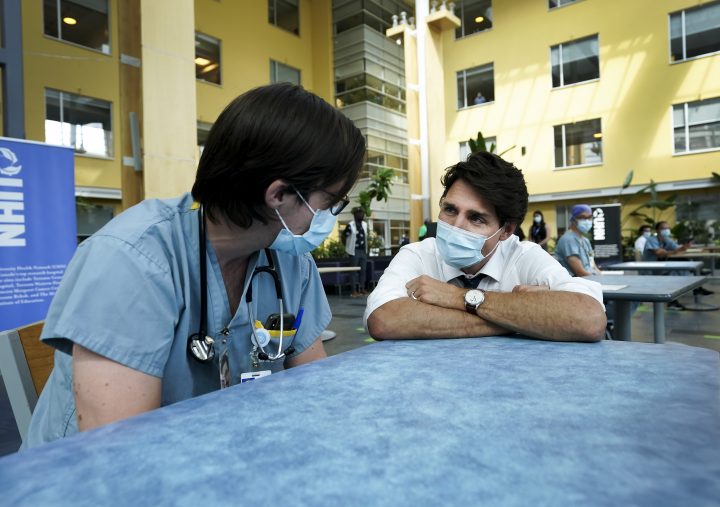With the Liberals expected to form government again, this means that COVID-19 vaccine mandates for federal government employees will likely go ahead – in addition to other health-related promises the party has made during the campaign.

Here’s a closer look at what you might be able to expect from this new Liberal government when it comes to health care.
Mandatory vaccines
Prime Minister Justin Trudeau announced that vaccines would be required for all federal government employees – just days before the election was called on Aug. 15. Given how Trudeau repeatedly emphasized how his mandatory vaccination plan was different from the Conservatives’, Canadians can probably expect this decision to hold.
“If they’ve won the election, it’s probably because of that,” said Colleen Flood, a research chair at the University of Ottawa and director of the Centre for Health Law, Policy and Ethics. “I think it was a great and savvy call on their part. I wish it had come a little earlier, but you take what you can get these days.”
Unlike their opponents, the Liberals had few promises relating to ways to prevent the next pandemic, focusing instead on fighting this one.
Health care
One of the biggest promises the Liberals made to improve the health care system was to provide $3.2 billion to the provinces and territories to hire 7,500 new family doctors, nurses and nurse practitioners.
Ivy Bourgeault, a professor at the University of Ottawa and leader of the Canadian Health Workforce Network, has a lot of questions about this proposal.
“Do we need more physicians and nurses? Absolutely. How many more do we need? That’s not clear. Where do we need them? Also not clear,” she said.
It takes time to train nurses and doctors and there is currently a North American shortage of these professions, noted Anne Snowdon, a professor of strategy and entrepreneurship at the University of Windsor who specializes in health supply chains.

Get daily National news
“There aren’t doctors waiting at home waiting for the phone call to say, sure, I’d like a job,” she said.
Retention is also a problem, Bourgeault said, particularly given how the pandemic stressed health systems.
The Liberals also promised to spend $6 billion to help eliminate waitlists for care.
Bourgeault called this a “simplistic pledge” that, in her view, doesn’t recognize that wait times are a human resources problem that is complex to solve.
“I give a lot of credit to the public, I think that they would understand to say all of these things, all of these pressure points that we have in the system, those are linked to our health workers,” she said.

Snowdon wonders whether more money is even the answer to Canada’s health woes.
“There are some things that money could be allocated to that could be exceptionally helpful,” she said.
But, Canada spends among the highest per capita on health care compared to other OECD countries, and doesn’t have health outcomes to match, she said.
“If you’re going to spend a lot of money and you’re in first place, then I’m all in,” she said. “But we’re spending amongst the highest in the world and we’re ranking in 10th place out of 11.”
Snowdon said she’d prefer to see more attention paid to health infrastructure and modernizing the health system, rather than simple pledges of more money.
What’s missing?
Paul Kershaw, a professor in the School of Population and Public Health at the University of British Columbia, and founder of the advocacy organization Generation Squeeze, said focusing on improving medical treatments by hiring doctors or shortening wait times is the best strategy for improving Canadians’ health.
“The research makes clear that health doesn’t start with medical care. Health starts where we’re born, grow, live, work and age,” he said.
Instead, long-term improvements to Canadians’ health would come from allocating more money to the social determinants of health – like income, housing, education and food insecurity – rather than just spending on medical care, he added.
Kershaw worries that the Liberal plan is focusing too much on medical treatment dollars at the expense of improving the social safety net, which also impacts people’s health. Health care transfer payments are already expected to grow faster than any other federal program with the exception of Old Age Security, he said.

“What we’re saying is that we want to use disproportionately all of the proceeds from economic growth and throw it into illness prevention at a moment we know we have an aging population where, yes, they’re going to need more medical care, but then there’s nothing left from economic growth to invest in the other things that actually make in particular a younger demographic healthy and well,” Kershaw said.
Bourgeault notes that the Liberal plan is missing details on how the federal government plans to deliver health care to people it’s responsible for: those who are incarcerated, the Canadian Forces, and people living on Indigenous reserves.
“We often forget that the federal government runs one of the fifth or sixth-largest health systems,” she said. “That would be really great to hear about what type of health policy they are going to implement in their own system. That is their lane. But no one talks about that.”







Comments